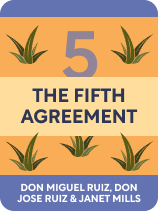

This article is an excerpt from the Shortform book guide to "The Fifth Agreement" by Don Miguel Ruiz. Shortform has the world's best summaries and analyses of books you should be reading.
Like this article? Sign up for a free trial here .
What do you believe to be true about the world and yourself? How well do you realize the importance of beliefs?
In The Fifth Agreement, Miguel Ruiz and Jose Ruiz discuss the importance of beliefs. They also explain that beliefs determine happiness—and how wrong beliefs cause damage to ourselves and others.
Keep reading to learn about the importance of beliefs.
The Importance of Beliefs
According to the authors, even if words aren’t universal and their meanings are variable, they do have a powerful effect on us. The words we use to describe ourselves, our environment, and the people around us set the tone of our perceived world.
(Shortform note: The segment of our personal language we use to describe ourselves or our world—both vocally and internally—is called “self-talk,” and it heavily affects our mood. This speaks to the importance of beliefs. People who use their internal voice to attack themselves are more likely to be depressed or anxious. When your internal voice keeps telling you, “I’m too stupid to do this,” or, “I’m too ugly to be loved,” you stop feeling hopeful about your future. As a result, you’re less likely to invest in that future by taking care of yourself or focusing on long-term goals—which, like the authors say, can profoundly impact your life.)
We Believe What We “Know”
The authors believe that if our personal language is full of criticism and judgment, we live in a world where acceptance must be earned and everyone’s pressured to live up to a standard. On the other hand, if the words we use to describe our reality are warm, loving, and cheerful, we feel more hopeful, loved, and worthy. And if we take the underlying cultural implications of the words we use as gospel, accepting them as concrete knowledge rather than subjective interpretations of reality, our perspective is aligned with the beliefs of our culture, and deviation from those beliefs will trouble us. This understanding helps us grasp the importance of beliefs in our lives.
(Shortform note: Why are we so quick to accept cultural beliefs (which very well might be wrong beliefs) as objective truth rather than subjective interpretations? It may be because we feel the need to conform to a group standard in order to fit in and find acceptance. Research shows that this compulsion to conform to the beliefs and norms of the group is so powerful that it can cause us to develop prejudice against others—and that outside of an environment in which we think we’re supposed to be prejudiced, we often behave very differently.)
This is the curse of knowledge, as the Toltec explain it. The more we know—the more we agree to believe and accept as fact—the less free will we have, because the more our view of the world is restricted. For instance, if our culture teaches us, through language, that it’s bad to be fat, and we believe that, we’re no longer free to be both fat and content. When we’re fat, we believe we must be ashamed of it, and that we can’t be happy with ourselves as we are. Our knowledge becomes a judge that lives in our head, pointing out every way in which we fail to live up to what we’ve learned to believe we should be. This illustrates the importance of beliefs.
(Shortform note: In the early 2000s, the link between belief and perception or behavior was clarified by several studies centering around the then-popular debate regarding the existence of free will. The results of this research can arguably be extrapolated to show that other beliefs or “knowledge” can change the way we approach our lives and relationships: Researchers found that people who believed there was no such thing as “free will” were more likely to cheat, steal, and make excuses to avoid helping others. In contrast, those who did believe in free will were more generous, worked harder, and felt life was more meaningful.)
Belief Determines Happiness
What is the importance of beliefs in our lives? The naguals’ point is largely that it’s our belief that matters most—how deeply we believe the things we “know” informs how much power those beliefs have over us. This is particularly important given most of our beliefs come from our society; we don’t choose those, so much of our perception of reality is out of our control.
Indeed, a core point the authors make is that in most cases, societal standards, norms, and beliefs are both deeply unhealthy and totally fabricated. The benchmarks we use to determine who’s good, bad, successful, unsuccessful are social constructs. In most cases, they’re nonsense, and they matter only because we’ve agreed they do. In short, the naguals suggest, we wouldn’t feel deficient if we weren’t taught to believe we’re deficient.
But—the naguals say—just because we believed everything our culture taught us as we grew up, when we didn’t have the capacity to doubt, doesn’t mean we have to keep believing it now. If each of us lives in our own subjective reality, why not interpret that reality in a way that encourages us to be happy?
| Positive Psychology: Four Happiness-Killing Mindsets The naguals don’t explicitly state which societally-advocated beliefs get in the way of our happiness, but positive psychologists (those who study happiness) weigh in on the importance of beliefs and identify four particularly damaging beliefs that prevent us from being happy. Each one identifies a success condition that’s impossible to achieve, and ties our value or satisfaction to our ability to achieve it. To be sustainably happy, positive psychologists say, we must discard the following wrong beliefs: Perfectionism: “I can and should attain perfection.” When you hold this belief, you attempt to meet unrealistic expectations and intangible goals. You can’t be happy unless you’re perfect and consistently generate perfect results. Social Comparison: “I must compare favorably to others.” When you hold this belief, you compare your attributes to those of others and focus on the ways in which you fall short. You can’t be happy when you’re not the best. Materialism: “I’m only worth as much as I have.” When you hold this belief, you can’t be happy because there’s always more to accumulate. Worse, if you lose your possessions, you lose what makes you feel valuable, so you’re always at risk. Maximizing: “I can always do better.” When you hold this belief, you can’t enjoy what you have because it’s inferior to what you could have. There’s always a better job, a more attractive partner, or a faster car. |
Once we grasp the importance of beliefs, we can more easily identify wrong beliefs and work to set them straight.

———End of Preview———
Like what you just read? Read the rest of the world's best book summary and analysis of Don Miguel Ruiz's "The Fifth Agreement" at Shortform .
Here's what you'll find in our full The Fifth Agreement summary :
- The five “agreements” to make with yourself that adjust your outlook
- How to rediscover your true self and recapture the freedom you felt as a child
- A five-step process to escape the mirage of “the real world”






